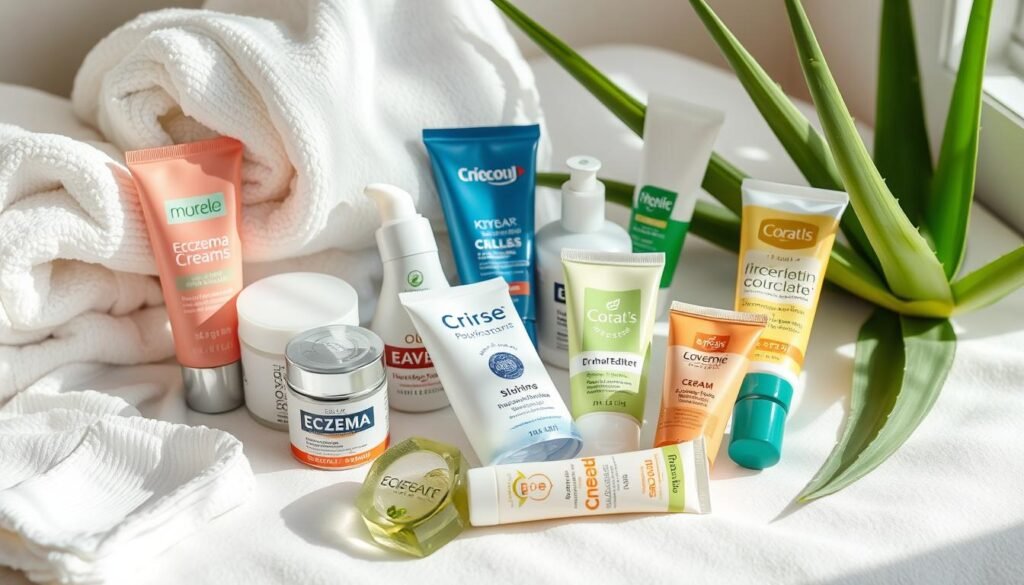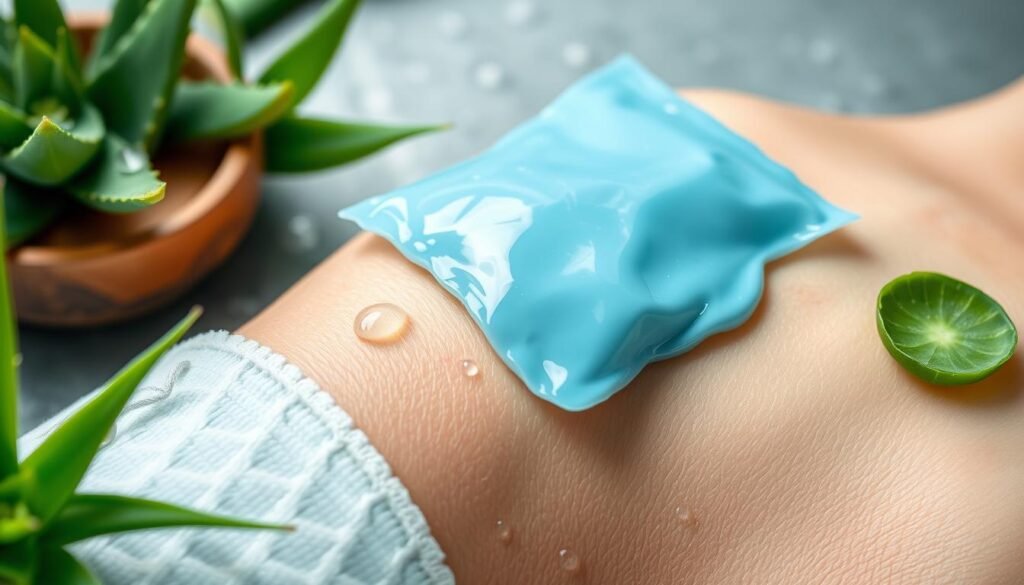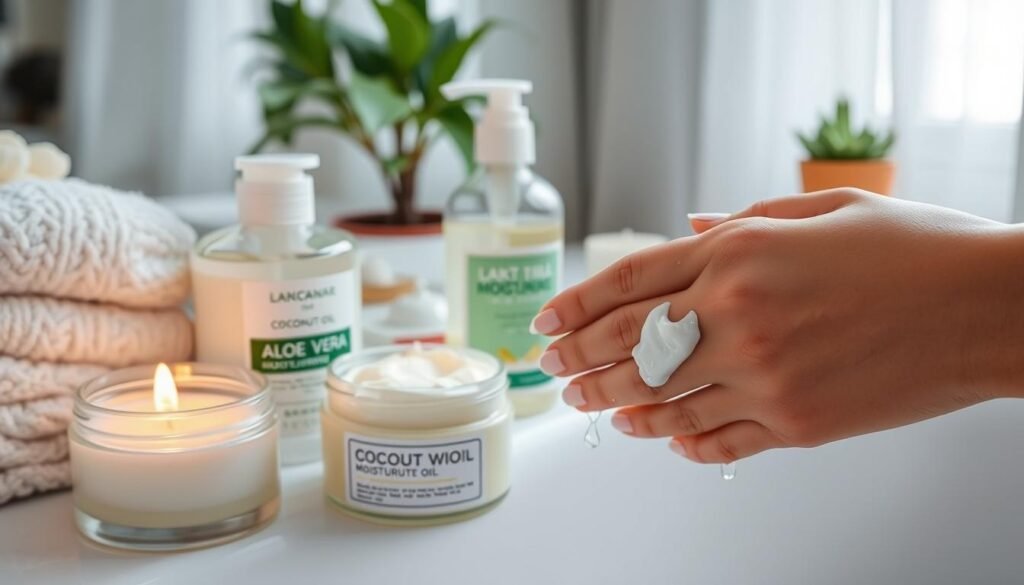Over 30 million Americans deal with eczema. This highlights the urgent need for effective itch relief. Those with eczema often face a cycle of scratching and discomfort. This can lower their quality of life greatly.
Finding successful itch relief techniques is key. It helps reduce eczema’s distress. This article looks at several methods, from eczema treatments to natural solutions. These insights might change how one tackles this skin issue. By trying these remedies, people can find relief and better wellbeing. Check out this resource for info on managing itchy eczema skin.
Key Takeaways
- Over 30 million people in the U.S. deal with eczema symptoms.
- Effective itch relief techniques are crucial for improving quality of life.
- There are a variety of eczema treatments available, including over-the-counter options.
- Natural remedies like oatmeal baths can be beneficial for symptoms relief.
- Consulting a healthcare professional is important when home remedies fail.
Understanding Eczema and Its Causes
Eczema, also known as atopic dermatitis, is a common skin issue. It leads to red, itchy patches that affect daily life. Learning about eczema causes helps manage it better.
Several things trigger eczema. Genes play a big part, especially if your family has a history of skin problems. Things in the environment like allergens, harsh soaps, and even the weather can set it off. Stress can also make eczema worse, affecting both mind and body.
About 10-20% of kids and 1-3% of adults in the U.S. have eczema. Knowing what causes eczema is a key step in finding relief and improving skin health.
| Contributing Factors | Description |
|---|---|
| Genetic Factors | Family history of eczema or related skin conditions increases susceptibility. |
| Environmental Triggers | Substances such as pollen, dust mites, and pet dander can provoke flare-ups. |
| Irritants | Products like soaps, detergents, and fabrics can irritate the skin. |
| Weather Changes | Extreme temperatures and low humidity often exacerbate eczema symptoms. |
| Stress | Emotional stress can lead to increased itchiness and flare-ups. |
The Importance of Itch Relief Techniques
Itch relief is vital for people with eczema. It goes beyond just the skin. Persistent itching can harm both the body and mind. It can mess up sleep, raise stress levels, and make someone pull back from others. Dealing with symptoms well can make skin and life better.
Research shows that good itch relief means better sleep and mood. This improvement touches many parts of life. People can do their daily tasks better and hang out more with friends.
Learning and using the right itch relief methods is empowering. It lets people manage their eczema better. This helps improve skin health. It also boosts independence and happiness.
Common Symptoms of Eczema
Eczema’s symptoms can be different for everyone. This makes early recognition key to managing it well. The common signs are:
- Red, inflamed skin
- Intense itching that can make daily tasks hard
- Dryness and flaky patches that might get worse
- Skin irritation that could lead to more problems
Flare-ups can happen without warning, causing discomfort and stress. Those with eczema may also face allergic reactions. This can make symptoms worse and add to the challenge. Eczema often goes hand in hand with asthma and hay fever. This makes symptoms more complicated.
Finding the link between skin irritation and eczema is key to quick relief. For more info on handling these symptoms, go to this resource.
| Symptom | Description |
|---|---|
| Red, Inflamed Skin | Significant discoloration and swelling of affected areas. |
| Intense Itching | Persistent urge to scratch, often leading to skin damage. |
| Dryness | Rough, scaly patches that may feel tight or uncomfortable. |
| Skin Irritation | Localized areas of tenderness and sensitivity. |
Knowing these symptoms is vital for spotting triggers. This helps in creating good relief and management plans.
Top Over-the-Counter Creams for Eczema
There are several creams you can buy without a prescription to help with eczema. Products like hydrocortisone creams, calamine lotion, and moisturizing lotions are very helpful. They ease symptoms and make your skin healthier. Learning about their benefits can help prevent and manage eczema outbreaks.
Hydrocortisone Creams
Many people choose hydrocortisone creams because they reduce inflammation. These creams cut down on itching and redness, making them great for intense eczema flare-ups. Remember, it’s important to follow the usage directions carefully. Using too much can harm your skin over time.
Calamine Lotion
Calamine lotion is famous for its calming effects. It’s particularly good for eczema that’s weeping or oozing. The lotion offers quick cooling relief for irritated skin. This makes it a favorite choice for immediate comfort.
Moisturizing Lotions
Keeping your skin moist is key to controlling eczema. Moisturizers prevent skin dryness and stop irritation. They create a barrier that protects your skin from irritants and reduces eczema episodes. It’s wise to choose lotions that are rich in emollients and don’t have fragrances.

| Product Type | Benefits | Usage Tips |
|---|---|---|
| Hydrocortisone Creams | Reduces inflammation and itching | Apply sparingly to affected areas |
| Calamine Lotion | Soothes irritation and dries oozing | Use as needed for immediate relief |
| Moisturizing Lotions | Prevents dryness and protects skin | Apply regularly, especially after bathing |
Natural Remedies for Eczema Itch Relief
Many people look for natural ways to ease eczema’s itchiness. Oatmeal baths and essential oils are two common choices. They offer comfort without using typical treatments. This helps soothe the itch and skin irritation.
Oatmeal Baths
Oatmeal baths are a trusted remedy for itching from eczema. Colloidal oatmeal, or very fine oatmeal, has ingredients that reduce skin inflammation. Soaking in an oatmeal bath lets your skin take in these helpful elements. This boosts moisture and lessens itchiness.
- Add 1 to 2 cups of colloidal oatmeal to warm bath water.
- Soak for 15 to 20 minutes to allow the skin to absorb the soothing properties.
- Pat the skin dry gently to avoid irritation after bathing.
Essential Oils
Essential oils are also great for easing eczema. Lavender and tea tree oil are especially good. They fight inflammation and calm the skin. These oils also help with relaxation and reduce skin redness.
- Always dilute essential oils with a carrier oil, such as coconut or jojoba oil, to avoid skin irritation.
- Perform a patch test to check for any potential allergic reactions before applying oils to larger areas of the skin.
To better manage eczema, combine these natural remedies with a good skincare routine. Remember, it’s vital to try these methods safely and think about what works best for you.
Cold Compresses: A Simple Solution
Cold compresses are a quick way to help with eczema. They manage itchiness shortly and effectively. When you put a cold, wet cloth on the skin, it can lessen swelling. It also calms the urge to scratch. Many people find this method simple and helpful.

- Soak a clean cloth or towel in cold water.
- Wring out excess water to avoid dripping.
- Apply the cold cloth directly to the itchy areas for 10 to 15 minutes.
- Repeat this process as needed, especially after flare-ups.
Cold compresses give fast relief and support other eczema treatments. Using them often can help control itchiness and manage flare-ups. This easy method is especially useful when other treatments are too complicated.
Try keeping a cold pack in your fridge for times you need quick comfort. This way, cold compresses can be a dependable part of your eczema care routine.
Using Antihistamines for Itch Management
Antihistamines are key in stopping eczema itch. They block the histamine receivers that cause itching. Eczema brings about a constant itch, especially at night. This can mess up your sleep. Taking antihistamines can ease this itch, helping those with eczema feel better.
For itch relief, people often use diphenhydramine and cetirizine. Diphenhydramine is good for night use because it makes you sleepy. Cetirizine is better for the day as it doesn’t make you tired.
The amount of antihistamine you should take varies. It’s important to follow the advice of a doctor. This ensures you use the medicine safely and effectively.
Side effects like feeling sleepy, having a dry mouth, or feeling dizzy may happen. Watching how you react to these medicines is key. Talk to a doctor for advice tailored to you. This helps in picking the right antihistamine for your eczema treatment.
| Medication | Indication | Side Effects | Recommended Use |
|---|---|---|---|
| Diphenhydramine | Nighttime itch relief | Drowsiness, dry mouth | Take before bed |
| Cetirizine | Daytime itch relief | Less sedating, headaches | Take as needed |
| Fexofenadine | Daytime relief for allergies | Headaches, nausea | Take as needed |
Effective Moisturizing Techniques
Moisturizing is key for controlling eczema well. Using the right moisturizing techniques helps lessen symptoms and reduce flare-ups. It’s important to choose when and what products you use to keep your skin hydrated and healthy.
The Right Time to Moisturize
Put on moisturizer right after you bathe to lock in moisture. This helps create a strong skin barrier and stops water loss. You should moisturize twice a day, especially when it’s dry, to keep your skin hydrated. Doing this regularly helps protect against eczema outbreaks.
Choosing the Best Products
Picking the right products is crucial for managing eczema. Look for fragrance-free and hypoallergenic options to avoid irritation. Choose products with ceramides, hyaluronic acid, and glycerin to help keep moisture in and improve skin health. Check out CeraVe for a great selection of eczema-friendly items. Learning about moisturizing techniques and the right products can lead to better skin and overall wellness.

| Product Type | Key Ingredients | Benefits |
|---|---|---|
| Creams | Ceramides, Hyaluronic Acid | Deep hydration, barrier protection |
| Lotions | Glycerin, Aloe Vera | Lightweight moisture, soothing properties |
| Ointments | Petrolatum, Mineral Oil | Long-lasting moisture retention |
When to Consult a Healthcare Professional
Knowing when to see a doctor for eczema is crucial for control. If itching continues even after using over-the-counter products, it’s time for expert advice. Also, if eczema gets worse, specialized care may be needed.
Getting the right diagnosis is important for the right eczema treatment. Doctors can give stronger medicines or new treatments you can’t get on your own. Seek medical help if you see inflammation, skin cracks, or get infections often.
If basic care and usual treatments don’t work, see a healthcare professional. Acting quickly can make your skin healthier and improve your life. Early action helps prevent problems from eczema that isn’t treated.
For more details on how to handle itchy skin, check out trusted sources. They offer deep insights into eczema treatment choices.
Conclusion
It’s vital to manage eczema itch for better skin health and life quality. There are many ways to soothe the itch of eczema. Options range from store-bought creams to homemade solutions and doctor-recommended treatments.
People should try various methods to find what works best for them. Staying hydrated, washing gently, and using creams or ointments are key. Trying different things can help find the best way to control eczema.
Looking into detailed studies can help understand treatment choices better. It’s important to learn as much as possible and get advice from doctors. This knowledge and guidance can really help improve skin conditions and overall happiness.